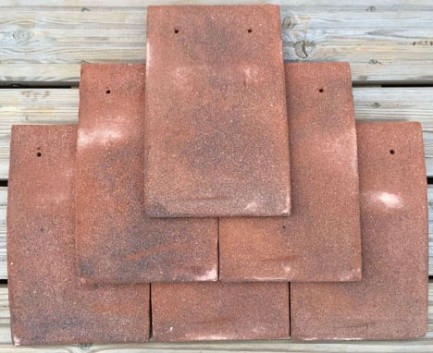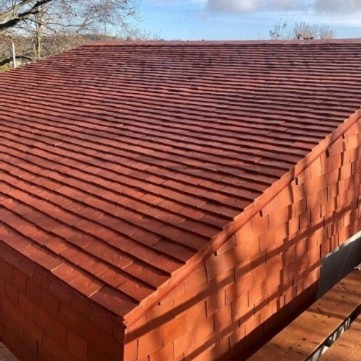Clayhall Roof Tiles in Hampshire
Heritage Tiles: Emblematic of the finest craftsmanship
Heritage tiles are the professional roofer's choice for the highest quality clay roof tiles. We pride ourselves in manufacturing, stocking, and delivering the very finest in prestige clay roof tiles.
Heritage Tiles have several tile ranges that satisfy every architectural requirement. Vintage and historic properties right up to modern new builds are covered by the diverse range of clay roof tiles that we stock.
So, whether you are in the building trade, or simply wish to choose your own tiles, Heritage Tiles have the right product for your specific requirements.
What Heritage Tiles have to offer our customers?
- We offer specification and technical solutions to help you achieve the perfect build.
- We also offer expert design advice to all our customers.
- We are happy to engage in site visits with our clients.
- We have stockists and distributors throughout the United Kingdom to ensure that we can provide our expert service to a wider area.
- We can provide estimated quantities from plans supplied by our clients.
- We offer battening plans.
- We can deliver a standard and bespoke colour choice for our clay tile products.
- All our tiles are assessed and approved by Lucideon.
- We provide a nationwide delivery and collection service.
The ranges of clay roof tiles we supply.
The Clayhall Range of roof tiles:

Clayhall Medium Blend - Carefully crafted to replicate all the features of handmade the Clayhall hand crafted range of tiles offers an excellent alternative when budget restrictions are a concern, but without compromising quality or durability.
Clayhall Dark Blend - Quality and durability in a budget clay roof tile. The Clayhall dark blend is sure to turn heads.
Clayhall Red Blend - A beautiful rustic clay roof tile. The Clayhall red blend is a firm favourite with our customers.
Clayhall Hamlet Mix - The Clayhall Hamlet mix is a gorgeous light and sandy looking clay roof tile that is a perennial favourite in the building trade.
Clayhall Birchwood Mix - The Clayhall Birchwood mix offers a gorgeous blend of lighter and darker shades in this diverse clay roof tile. If you are concerned that your roof tiles could look monotonous, the Clayhall Birchwood mix is the clay roof tile to choose.
The Conservation Range of roof tiles

The Conservation range of roof tiles are available in a range of distinctive colours, created by using a very fine sand, The Conservation Weathered; A natural warm tone, achieving an instant mellow and settled look and The Conservation Red; perfect for vertical tiling especially suited for villages and hamlets with olde world vernacular charm.
Manufactured using high quality clay, achieving high strength and durability properties, giving homeowners and contractors peace of mind for many years to come. The conservation range comes with a complete set of associated fittings, including Hog Back Ridge, Half Round Ridge, Bonnet Hips, Valley tiles and External Angles.
The Conservation range of clay roof tiles comes in the following variations:
- Conservation Red
- Conservation Weathered
- Conservation Dark
Conservation Peg Tile
Plain clay roofing tiles laid to a double lap have been used for roof covering in England since before the Norman Conquest and tiles dating back to Roman Times have been discovered under excavation. From the outset clay plain tiles were made incorporating fixing features.
The Classic Edwardian roof tile
The Classic range of plain tiles is one of the finest ranges of clay tiles.
We source only the best raw materials for our craftsman to create beautifully handmade clay tiles of the highest quality and durability.
Tile Fittings available from Heritage Tiles
There are many fittings that are available from us a Heritage Tiles to complete your build to perfection. We stock and supply the following:
- Gable Tile
- Eave Tile
- Baby Porch Ridge
- 90 Degree Ext. Angle
- Universal Bonnet Hip
- Half Round Ridge
- Hogs Back Ridge
- Mono Ridge
- Third Round Ridge
- Universal Valley
- Ornamental Club
- Bat Tile Set
Bat Tiles:
Provide help for our bats with our range of bat friendly roof tiles.
Did you know that all UK bats and their roosts are protected by law? The Wildlife and Countryside Act introduced in 1981, gave legal protection to all bat species and their roosts in England.
Distinct species of bats prefer differing places to roost. The two most usually found species of bat in the UK are the Pipistrelle and Brown Long-Eared Bat. Pipistrelle prefer confined spaces such as under tiles on roofs and hanging spaces. The Brown Long-Eared Bat prefer roof timbers and ridges inside lofts. Heritage Clay Tiles can provide purpose made access points within your roof tiles or ridge tiles. The Bat Tile Set can form part of a mitigation package required by law for existing roosts or as potential access where a roost had not previously been present.
Select a Blend
Getting the right blend for your roofing project can feel daunting, but with our blend generator you can mix and match various blends of tiles to achieve the perfect blend.
Click here to make use of our online tool to choose your own unique blend.
Because our strict quality control provides a consistent tile size you can mix assorted styles and colours of tiles to make your roof unique to you. Please use the tool below to experiment with various blends.
Adjust the sliders to set the ingredients for your desired blend then click on the update mix button.
Alternatively click on any blend or tile to display it.
Whatever type of clay roof tile you want, Heritage Tiles will be able to help.
Clayhall Roof Tiles
With Heritage Clay Tiles Ltd, you can make a truly individual statement with your property by mixing colours to create a totally custom made roof. Blended shades add an extra element of uniqueness to your property, so imaginative designs and concepts can be incorporated to provide something that is a individual to your project. For those that like a pre blended product, we are happy to supply these with our Hamlet Mix and Birchwood Mix from the Clayhall roof tile range.
We all want our property to look the best it can be and having access to high quality products really do make all the difference to getting a good job done. The Clayhall roof tile range will be the crowning glory to any new build or refurbishment to any existing property.
With the gorgeous shades and pleasing textures offered by the Clayhall roof tile range, you really cannot go wrong when ordering these superior tiles. The price is also a bit of an eye opener to our customers too. They expect are higher price tag when they see the sheer quality of the Clayhall roof tile.
So should you require high quality roof tiles at a very competitive price, call Heritage Clay Tiles Ltd and ask about the Clayhall roof tile range for your next roofing project.
A little information about Hampshire
History of Hampshire
The county of Hampshire is believed to have been continuously occupied since the end of the last Ice Age about 12,000 BC. At this time, Britain was still attached to the European mainland and was mostly covered with deciduous woodland.
The first inhabitants of Hampshire were Mesolithic hunter gatherers. The vast majority of the population would have been based around the river valleys. Over several thousand years, the climate became much warmer, and sea levels rose; the English Channel, which started out as a river, was a major inlet by 8000 BC, although Britain was still connected to Europe by a land bridge across the North Sea until 6500 BC. Notable sites from this period include Bouldnor Cliff.
Agriculture had started in ernest in southern Britain by 4000 BC, and with it a neolithic culture. Some deforestation took place at that time, although during the Bronze Age, beginning in 2200 BC, this became more widespread. Hampshire lacks monuments to show from these early periods, although nearby Stonehenge was built in several phases at some time between 3100 and 2200 BC. In the very late Bronze Age, fortified hilltop settlements known as hillforts began to appear in large numbers in many parts of Britain including Hampshire, and these became more and more important in the early and middle Iron Age; many of these are still visible in the landscape today and can be visited, notably Danebury Rings. By this time, the people of Britain mostly spoke a Celtic language, and their culture shared much in common with the Celts.
The demise of the hill forts
Hillforts seemed to have declined in importance in the second half of the second century BC, with many being abandoned. Probably around this period, the first recorded invasion of Britain took place, as southern Britain was largely conquered by warriors from Belgic tribes of northeastern Gaul. By the time of the Roman conquest, the oppidum at Venta Belgarum, which is now Winchester, was the de facto regional administrative centre; Winchester was, however, of secondary importance to the Roman town of Calleva Atrebatum, now Silchester, built further north by a dominant Belgic polity known as the Atrebates in the 50s BC. The Roman Emperor Julius Caesar invaded southeastern England briefly in 55 and again in 54 BC, but he never actually reached the county of Hampshire.
The Roman army invaded Britain again in 43 AD, and Hampshire was incorporated into the Roman province of Britannia. It is believed their political leaders allowed themselves to be incorporated peacefully. Venta became the capital of the administrative polity of the Belgae, which included most of Hampshire and Wiltshire and reached as far as Bath. Whether the people of Hampshire played any role in Boudiccas rebellion of 60 AD to 61 AD is not recorded, but evidence of burning is seen in Winchester dated to around this period. For most of the next three hundred years, southern Britain made the most of a peaceful existence. The later part of the Roman period had most towns build defensive walls; a pottery industry based in the New Forest exported items widely across southern Britain.
A fortification near Southampton was called Clausentum, part of the Saxon Shore forts, traditionally seen as defences against maritime raids by Germanic tribes. The Romans left Britain in 410 AD.
Two major Roman roads, Ermin Way and Port Way cross the north of the country connecting Calleva Atrebatum with Corinium Dobunnorum, modern Cirencester, and Old Sarum. Other roads connected Venta Belgarum with Old Sarum, Wickham and Clausentum. A road, presumed to diverge from the Chichester to Silchester Way at Wickham, connected Noviomagus Reginorum, modern Chichester, with Clausentum.
Records are unreliable for the next two centuries, but in this time, southern Britain went from being Brythonic to being English and Hampshire emerged as the centre of what was to become the most powerful kingdom in Britain, the Kingdom of Wessex. Evidence of early Anglo-Saxon settlement has been found at Clausentum, dated to the fifth century. By the seventh century, the population of Hampshire was predominantly English speaking; around this period, the administrative region of Hampshire seems to appear. Albany Major suggested that the traditional western and northern borders of Hampshire may even go back to the very earliest conquests of Cerdic, legendary founder of Wessex, at the beginning of the sixth century. Wessex, with its capital at Winchester, gradually expanded westwards into Brythonic Dorset and Somerset in the seventh century. A statue in Winchester celebrates the powerful King Alfred, who drove away the Vikings and stabilised the region in the 9th century. King Alfred proclaimed himself King of England in 886; but Athelstan of Wessex did not officially control the whole of England until 927 AD.
Products available from Heritage Clay Tiles Ltd in East Sussex
Clay Roof Tiles in East Sussex
Clayhall Roof Tiles in East Sussex
Conservation Roof Tiles in East Sussex
Edwardian Roof Tiles in East Sussex
Victorian Roof Tiles in East Sussex
Georgian Roof Tiles in East Sussex
Handmade Clay Tiles in East Sussex
Handmade Roof Tiles in East Sussex
High Quality Roof Tiles in East Sussex
Traditional clay tiles in East Sussex
Traditional roof tiles in East Sussex
Products available from Heritage Clay Tiles Ltd in Essex
Conservation Roof Tiles in Essex
High Quality Roof Tiles in Essex
Traditional clay tiles in Essex
Traditional roof tiles in Essex
Products available from Heritage Clay Tiles Ltd in Hampshire
Conservation Roof Tiles in Hampshire
Edwardian Roof Tiles in Hampshire
Victorian Roof Tiles in Hampshire
Georgian Roof Tiles in Hampshire
Handmade Clay Tiles in Hampshire
Handmade Roof Tiles in Hampshire
High Quality Roof Tiles in Hampshire
Traditional clay tiles in Hampshire
Traditional roof tiles in Hampshire
Products available from Heritage Clay Tiles Ltd in Hertfordshire
Clay Roof Tiles in Hertfordshire
Clayhall Roof Tiles in Hertfordshire
Conservation Roof Tiles in Hertfordshire
Edwardian Roof Tiles in Hertfordshire
Victorian Roof Tiles in Hertfordshire
Georgian Roof Tiles in Hertfordshire
Handmade Clay Tiles in Hertfordshire
Handmade Roof Tiles in Hertfordshire
High Quality Roof Tiles in Hertfordshire
Traditional clay tiles in Hertfordshire
Traditional roof tiles in Hertfordshire
Products available from Heritage Clay Tiles Ltd in Kent
Conservation Roof Tiles in Kent
High Quality Roof Tiles in Kent
Traditional clay tiles in Kent
Traditional roof tiles in Kent
Products available from Heritage Clay Tiles Ltd in London
Conservation Roof Tiles in London
Edwardian Roof Tiles in London
Victorian Roof Tiles in London
High Quality Roof Tiles in London
Traditional clay tiles in London
Traditional roof tiles in London
Products available from Heritage Clay Tiles Ltd in Surrey
Conservation Roof Tiles in Surrey
Edwardian Roof Tiles in Surrey
Victorian Roof Tiles in Surrey
High Quality Roof Tiles in Surrey
Traditional clay tiles in Surrey
Traditional roof tiles in Surrey
Products available from Heritage Clay Tiles Ltd in West Sussex
Clay Roof Tiles in West Sussex
Clayhall Roof Tiles in West Sussex
Conservation Roof Tiles in West Sussex
Edwardian Roof Tiles in West Sussex
Victorian Roof Tiles in West Sussex
Georgian Roof Tiles in West Sussex
Handmade Clay Tiles in West Sussex
Handmade Roof Tiles in West Sussex
High Quality Roof Tiles in West Sussex
Traditional clay tiles in West Sussex
Traditional roof tiles in West Sussex
Products available from Heritage Clay Tiles Ltd in Bedfordshire
Clay Roof Tiles in Bedfordshire
Clayhall Roof Tiles in Bedfordshire
Conservation Roof Tiles in Bedfordshire
Edwardian Roof Tiles in Bedfordshire
Victorian Roof Tiles in Bedfordshire
Georgian Roof Tiles in Bedfordshire
Handmade Clay Tiles in Bedfordshire
Handmade Roof Tiles in Bedfordshire
High Quality Roof Tiles in Bedfordshire
Traditional clay tiles in Bedfordshire
Traditional roof tiles in Bedfordshire
Products available from Heritage Clay Tiles Ltd in Berkshire
Clayhall Roof Tiles in Berkshire
Conservation Roof Tiles in Berkshire
Edwardian Roof Tiles in Berkshire
Victorian Roof Tiles in Berkshire
Georgian Roof Tiles in Berkshire
Handmade Clay Tiles in Berkshire
Handmade Roof Tiles in Berkshire
High Quality Roof Tiles in Berkshire
Traditional clay tiles in Berkshire
Traditional roof tiles in Berkshire
Products available from Heritage Clay Tiles Ltd in Buckinghamshire
Clay Roof Tiles in Buckinghamshire
Clayhall Roof Tiles in Buckinghamshire
Conservation Roof Tiles in Buckinghamshire
Edwardian Roof Tiles in Buckinghamshire
Victorian Roof Tiles in Buckinghamshire
Georgian Roof Tiles in Buckinghamshire
Handmade Clay Tiles in Buckinghamshire
Handmade Roof Tiles in Buckinghamshire
High Quality Roof Tiles in Buckinghamshire
Traditional clay tiles in Buckinghamshire
Traditional roof tiles in Buckinghamshire
Products available from Heritage Clay Tiles Ltd in Cambridgeshire
Clay Roof Tiles in Cambridgeshire
Clayhall Roof Tiles in Cambridgeshire
Conservation Roof Tiles in Cambridgeshire
Edwardian Roof Tiles in Cambridgeshire
Victorian Roof Tiles in Cambridgeshire
Georgian Roof Tiles in Cambridgeshire
Handmade Clay Tiles in Cambridgeshire
Handmade Roof Tiles in Cambridgeshire
High Quality Roof Tiles in Cambridgeshire
Traditional clay tiles in Cambridgeshire
Traditional roof tiles in Cambridgeshire
Products available from Heritage Clay Tiles Ltd in Oxfordshire
Clay Roof Tiles in Oxfordshire
Clayhall Roof Tiles in Oxfordshire
Conservation Roof Tiles in Oxfordshire
Edwardian Roof Tiles in Oxfordshire
Victorian Roof Tiles in Oxfordshire
Georgian Roof Tiles in Oxfordshire
Handmade Clay Tiles in Oxfordshire
Handmade Roof Tiles in Oxfordshire
High Quality Roof Tiles in Oxfordshire
Traditional clay tiles in Oxfordshire
Traditional roof tiles in Oxfordshire
Products available from Heritage Clay Tiles Ltd in Suffolk
Clayhall Roof Tiles in Suffolk
Conservation Roof Tiles in Suffolk
Edwardian Roof Tiles in Suffolk
Victorian Roof Tiles in Suffolk
Georgian Roof Tiles in Suffolk
Handmade Clay Tiles in Suffolk
Handmade Roof Tiles in Suffolk
High Quality Roof Tiles in Suffolk
Traditional clay tiles in Suffolk
Traditional roof tiles in Suffolk
Further Information
If you would like to know more or are interested in a quote we would be happy to help. Phone us on 01634 471 344, email us at sales@heritagetiles.co.uk and we will be in touch as soon as possible.







